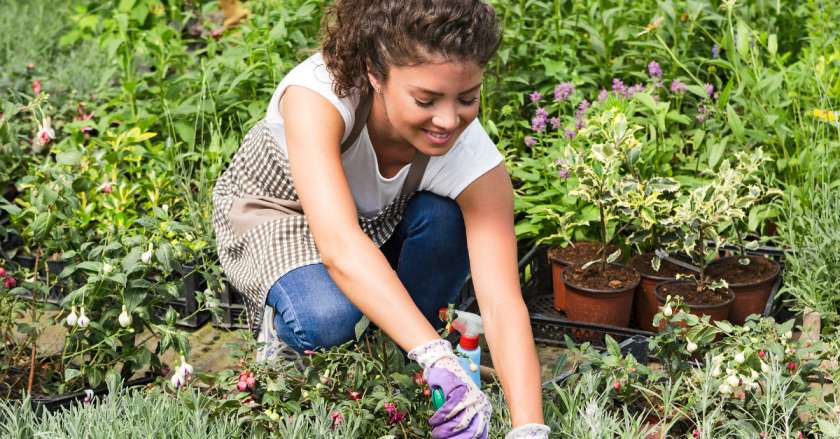Introduction
Gardening is more than a way to grow food or beautify surroundings. It can also be a sacred act of connecting with nature and with your own inner self. When you bring mindfulness into gardening, it becomes a spiritual practice. You plant more than seeds—you plant patience, peace, and purpose.
This article explores how gardening can become a form of meditation, healing, and inner growth. Written in simple English for the Indian audience, it explains how gardening can nourish your body, mind, and soul while offering practical steps to get started.
Why Gardening Feels Spiritual

Touching soil, watering seeds, and watching plants grow can feel like prayer in motion. The soil reminds us of our roots, water teaches us to flow, fire from the sun inspires growth, air refreshes us, and space gives us freedom.
In a busy modern world, gardening helps us slow down. It brings us back to the present moment. Many spiritual traditions see working with earth as a form of devotion. In this way, gardening becomes both therapy and meditation.
Also Read Spiritual Lessons from the Five Elements: Earth, Water, Fire, Air, and Space
Spiritual Benefits of Gardening
- Stress Relief: Spending time with plants calms the mind and reduces anxiety.
- Mindfulness Practice: Gardening trains you to stay present and aware.
- Connection with Nature: You feel part of a bigger cycle—birth, growth, decay, and renewal.
- Gratitude: Tending plants reminds you to be thankful for food, water, and life.
- Healing: Many people find comfort and emotional balance while caring for plants.
How to Turn Gardening into a Spiritual Practice
1. Begin with Intention
Before you start gardening, take a moment to set a quiet intention. It can be simple, like: “I will be mindful today” or “I offer this work with gratitude.”
2. Breathe with the Earth
Slow down and match your breath with your gardening activity. Feel the rhythm of digging, watering, or pruning. Treat each task as a moving meditation.
3. Use All Senses
Gardening is a sensory experience. Smell the soil, listen to rustling leaves, feel textures, and taste herbs. Using all senses increases awareness and deepens your connection.
4. Offer Thanks
When harvesting vegetables, flowers, or herbs, take a moment to give thanks to the Earth, water, and sunlight. Sharing your harvest with others is also a spiritual act of generosity.
5. Learn from Cycles of Nature
Plants bloom, fade, and return again. This natural cycle teaches acceptance, patience, and renewal. Even composting teaches how endings create fresh beginnings.
Gardening Practices for Indian Homes
Balcony and Terrace Gardening
In Indian cities, space can be small. Balcony gardens and terrace farming are growing trends. You can grow coriander, mint, tomatoes, and chilies easily in pots. This daily interaction with plants can be your moment of mindfulness.
Sacred and Medicinal Plants
Growing spiritual plants like Tulsi, Neem, Aloe Vera, or Turmeric connects gardening with Indian traditions. These plants carry healing properties and add deeper meaning to your practice.
Community Gardening
Temple groves and community gardens have been part of Indian culture for centuries. Today, urban communities are reviving shared green spaces, bringing both social and spiritual harmony.
A Simple Daily Gardening Ritual (10–20 minutes)
- Wash hands and stand quietly near your garden. Take three slow breaths.
- Set an intention like “I will care for this life with love.”
- Water, weed, or prune slowly, staying fully aware.
- Pause to listen to birds, wind, or silence for one minute.
- Close with a small moment of gratitude.
Common Challenges in Gardening
- Lack of Space: Use pots, vertical planters, or window boxes.
- Busy Schedule: Even 5–10 minutes daily is enough to connect.
- Lack of Knowledge: Start with easy plants like mint, tulsi, or aloe.
- Fear of Failure: Remember, gardening is about learning from cycles. Every plant has lessons.
FAQs on Gardening as a Spiritual Practice
Q1: Can gardening improve mental health?
Yes, gardening helps reduce stress, improves mood, and gives emotional balance
Even 10–20 minutes daily can bring peace and mindfulness..
Q3: Which plants are considered sacred in India?
Tulsi, Neem, Banyan, and Lotus hold strong spiritual value.
Q4: Can children also practice spiritual gardening?
Yes, gardening teaches children patience, responsibility, and love for nature.
Q5: Is terrace gardening suitable for spiritual practice?
Yes, terrace gardens are perfect for city dwellers. They provide fresh produce and also create a peaceful green space.
Conclusion
Gardening as a spiritual practice helps you reconnect with nature and with yourself. It teaches patience, gratitude, and mindfulness. Whether you grow tulsi on your balcony or vegetables on your terrace, each plant can be a spiritual teacher.
Start small. Water your plants with awareness. Care for them as you would care for your soul. With time, gardening will become more than a hobby. It will become a daily meditation that nurtures your body, mind, and spirit.










